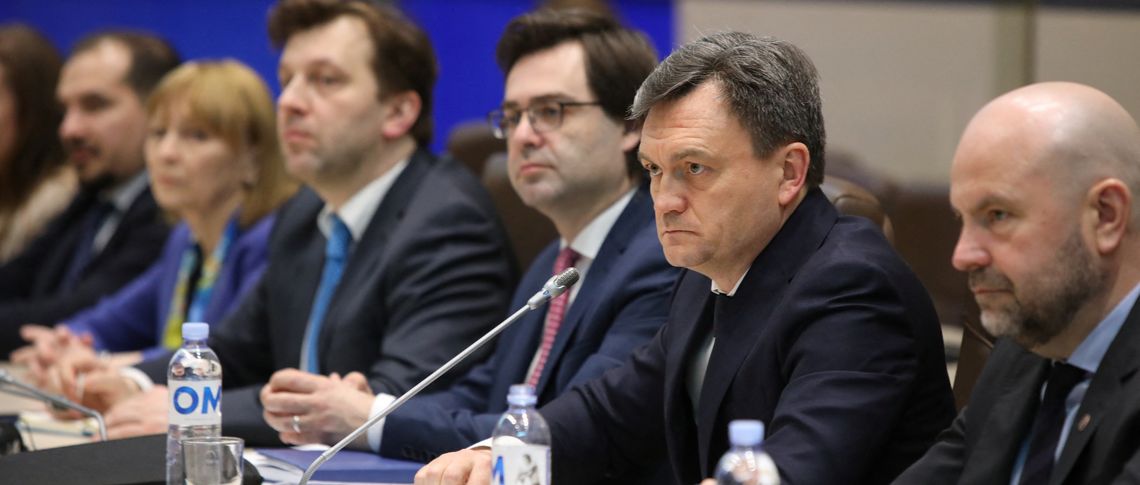The Republic of Moldova, which seemed to be a relative island of stability, is again at the centre of the news. The government of Natalia Gavrilitsa resigned at a time when President Maia Sandu announced Russia's plans to destabilise the country. What is going on?
Stability has been indeed relative, as Moldova had to go through a series of crises since Gavrilitsa came to power. Gavrilitsa's cabinet had one of the most difficult mandates since Moldova's independence, marked by multiple overlapping crises – the war in neighbouring Ukraine and the humanitarian crisis caused by the influx of refugees as well as energy blackmail exacerbated by unprecedented inflation and rising prices. Despite the fact that the government has coped pretty well with the crises, in my opinion, it is the growing public discontent with the socio-economic situation and the erosion of the political capital of its ruling party that were the main reasons for the resignation of the Gavrilitsa government.
Dissatisfaction with the ruling PAS (Party of Action and Solidarity) also has to do with the slow progress of the justice reform and the fight against corruption. This was the main promise made by the party in the election campaign and one of the top priorities on the government's agenda. And this is exactly where progress has been extremely slow, causing public criticism and discontent.
Undoubtedly, the security situation is extremely difficult and more decisive actions were expected from the authorities. Nevertheless, I believe that all of the above contributed to the resignation of the government.
The Moldovan Parliament at its meeting on Thursday approved a new government headed by Dorin Recean, who previously served as presidential adviser on defence and national security. How has the new government changed?
Personally, I did not have high expectations for the new government and the new-old cabinet voted yesterday by Parliament has confirmed this. I am calling it the new-old government because only a few ministers changed, the others remained in office, including those representing key sectors who were considered ineffective. I really hope that the change of government will not be just an imitation of change in the country.
However, the priorities announced by the new Prime Minister Recean, which refer to the restoration of order and discipline in state institutions in addition to economic development, and peace and stability, inspire a dose of optimism.
In regards to order and discipline, it is imperative to restore effective state control as the judiciary, for example, remains captured by interest groups that have been exerting pressure. State institutions have been powerless in the face of this scourge. Criticisms regarding political interference in the judiciary and the fact that power remains tempted to control the institutions have been also valid, so the new government will have the mission of demonstrating that ensuring independence of the judiciary is part of the justice reform.
The advancement of the justice reform is going to be defining for the success of the new government and the achievement of its programme, as all other sectors will be affected by progress or lack therefor in this area. The European course of the country will also depend on this. Our development partners place their highest hopes on the justice reform and fight against corruption, which is also reflected in six of the nine recommendations of the European Commission in regards to Moldova’s EU candidate status.
In the economic sphere, there is a need for a visionary approach to economic development and it remains to be seen whether the new government will succeed in this.
As for the priority of ensuring peace and security, its importance is self-evident given the extremely precarious security situation against the background of Russia's revanchism. The role of the new government is to correctly identify the risks and threats and develop a new security and defence strategy. And here things should happen quickly.
None of the above will be possible without strong and competent state institutions as well as professional and motivated civil servants. A scarcity in human resources was one of the big problems of the Gavrilitsa’s Government, which could also make it difficult to achieve the Recean cabinet’s programme. The ability to attract competent people to work for state institutions and make the decision-making process more transparent, inclusive and participatory will matter.
Will the change of government affect the European course of Moldova?
Prime Minister Recean stated that the objective of his governmental programme is to implement President Maia Sandu’s vision and the plan of the Action and Solidarity Party, with strict adjustments to current realities. Thus, European integration remains a priority and it is the ability to implement the European reform agenda which will influence the European course of the country. Both the quality and the speed with which the reforms will be carried out are important.
How real is the threat from Russia?
It is a real threat that we have all been talking about and experiencing since the war in Ukraine began. However, the situation in the Republic of Moldova will depend a lot on the events in the neighbouring country. As long as the Ukrainians resist, an armed conflict in the Republic of Moldova is unlikely.
However, the danger of overthrowing power through a hybrid war that Russia has been operating in Moldova remains valid. Here, I mean the informational war and the pro-Russian political forces controlled by fugitive oligarchs who take advantage of the socio-economic problems of the country to radicalise the population and organise massive protests, thus destabilising the country. This is a fertile ground for subversive actions with the involvement of foreign elements, which is a real danger, to which also President Maia Sandu has referred to recently.
NATO is now working on how to increase support for ‘partners vulnerable to Russian intervention.’ What kind of support is Moldova counting on?
It is not known whether Moldova will be provided with surveillance and air defence systems, as recently requested by Maia Sandu. However, Moldova can count on support in developing its military personnel and civil servants; on the means of protection of military personnel and on assistance in the field of cybersecurity.
For the next period it will be important for Moldova to obtain military equipment, including lethal weapons from NATO, to strengthen its military capabilities and deter a possible attack from the Russian Federation.
We hope, however, that the new status of the Republic of Moldova as a candidate country to join the European Union will mark a new stage of cooperation in the field of security and defence between the Republic of Moldova and the European Union, but also with NATO.






